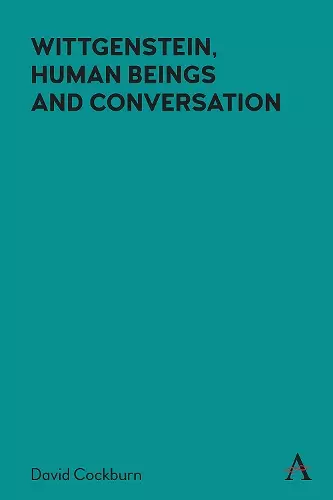Wittgenstein, Human Beings and Conversation
Format:Hardback
Publisher:Anthem Press
Published:16th Nov '21
Currently unavailable, and unfortunately no date known when it will be back

Develops, in a critical spirit, themes in Wittgenstein’s treatment of mind and language, giving central place to the individual’s relations with others in a way that involves detailed attention to the human bodily form and to conversation, and a significant ethical dimension.
These papers develop, in a critical spirit, themes in Wittgenstein’s treatment of mind and language. The approach is distinctive in giving central place to the individual’s relations with others in a way that involves detailed attention to the human bodily form and to conversation, and a significant ethical dimension.
This book brings together David Cockburn’s best work on Wittgensteinian themes relating to ‘mind’ and ‘language’. While none of these papers is well described as ‘exegetical’, most are discussions of Wittgenstein, and all are discussions of themes central to his later work and strongly influenced by it. The papers can be roughly divided between ‘the philosophy of mind’ and ‘the philosophy of language’. They are, however, united by the idea that this standard classification of topics stands in the way of clear thinking about core issues, and, closely connected with that, united by the idea that the notion of a human being must be central to any philosophical treatment of them. Cockburn’s approach is marked by the detailed attention given to the human bodily form, and his approach to language by the central place given to the idea of conversation. The discussions are enriched by incorporating some consideration of our relation to non-human creatures. The papers are linked by an insistence on the inescapably ethical dimension of any adequate discussion of these issues. While the debt to Wittgenstein is enormous, a number of the papers involve what may be significant criticisms of him.
"These are deeply thoughtful papers. David Cockburn turns our attention to features of our lives that we too frequently lose sight of in philosophy. Readers will especially profit from the wide-ranging and realistic examples and from the many ways Cockburn brings out the ethical significance of our philosophical questions about mind and language.” — Cora Diamond, Corcoran Department of Philosophy, University of Virginia
"David Cockburn manages to throw new and unexpected light on some of the traditional problems of mind and language. His work is exceptional in its ability to combine depth of reflection with accessibility of presentation. This volume raises the question of what it means to be human, as this is brought out in our mutual relations, in expressive behaviour and conversation. Cockburn’s thought is characterized by attention to the ethical dimension which is crucial to an understanding of our shared life. The nature of humanity is further illuminated by an emphasis on the continuities between human and animal life. Ideas formulated by Wittgenstein are here carried forward in fruitful ways.” — Lars Hertzberg, Department of Philosophy, Åbo Akademi University
"The intelligence at work in these essays is at once humane, subtle and penetrating. While David Cockburn has learnt deeply from Wittgenstein, the voice heard here is very distinctly Cockburn’s own. I have learned a great deal from listening carefully to it. Cockburn’s approach to the many themes of his essays is refreshingly free of ‘baggage’. It reflects an appreciation that you have to let whatever you write about show you how to write about it. The result is a freshness and an openness of philosophical thinking that is both very unusual, and urgently needed, in the contemporary philosophical scene. This is a terrific collection.” — Christopher Cordner, University of Melbourne, Victoria
"This is a beautiful and rewarding collection. It brings together David Cockburn’s distinctively sensitive, careful, and original philosophical thinking around questions of what it means to be a human being and what Wittgenstein’s philosophy can teach us about it. — Maria Balaska, Lecturer in Philosophy at the University of Hertfordshire, UK
The volume is a collection of 12 essays, all of which, except for the introduction and the seventh chapter ‘Not Empiricism and Yet Realism’, have been published previously in some form. The essays span from the early ‘The Mind, the Brain and the Face’ from 1985, to ‘Deirdre’s Smile: Names, Faces and ‘the Simple Actuality’ of Another’, published in 2021. Reading the essays together as a whole, however, adds real value, since they are not introduced chronologically but organized thematically in a way that allows one to discern what is distinctive of Cockburn’s philosophical vision — Camilla Kronqvist, Philosophy, Faculty of Arts, Psychology and Theology, Abo Akademi University, Turku, Finland; Philosophical Investigations 2022.
ISBN: 9781785279270
Dimensions: 229mm x 153mm x 26mm
Weight: 454g
206 pages